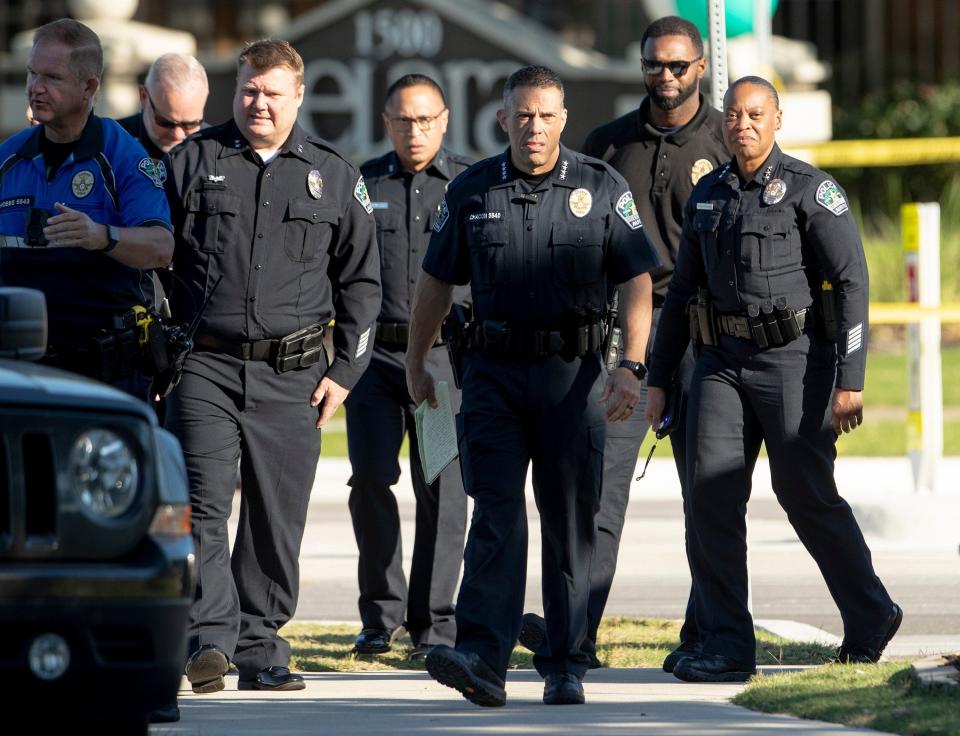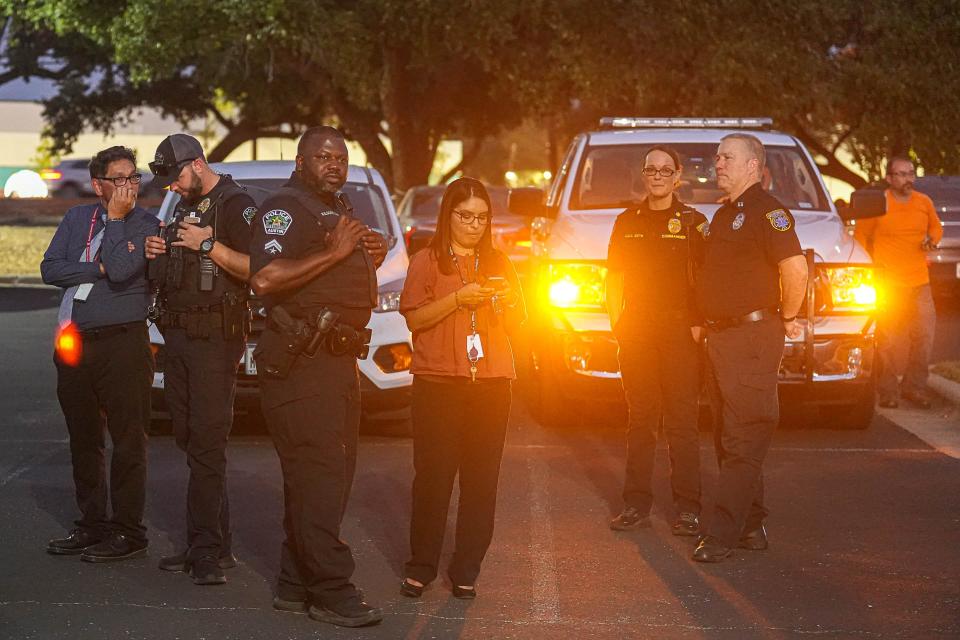Arrested in Austin? Soon you might have a virtual bail hearing in police custody
Editor's note: This story was updated to correctly identify the type of judge who determines whether probable cause for an arrest exists.
The city of Austin might soon change what happens after someone is arrested — namely, where the person is held and how bail is set.
As the Austin Chronicle first reported in late September, the Austin Police Department is spearheading a virtual magistration pilot program, which will test a new way of processing people who have been arrested. In this program — which police say will begin late this year or early next year — the Police Department will retain custody of arrestees, and the city will conduct virtual bail hearings.
Critics of the plan, including prominent defense attorneys, say that key stakeholders weren’t consulted. They are frustrated by what they see as an attempt to undercut a yearslong push to provide defense counsel at bail hearings.
A police spokesperson, who disputed claims that public officials weren't included in planning, said that the program was born out of a desire to save the city money.
Magistration in Travis County, which currently occurs without a prosecutor or defense lawyer present, has become a contested process. Civil rights advocates argue that the U.S. Constitution provides for representation at all stages of the legal process, including bail hearings.
Legal experts who spoke to the American-Statesman said that magistration is a crucial step in the criminal legal process. Whether someone remains in jail, and under what conditions, has a considerable impact on the outcome of the case. Advocates also said that even a brief stint in jail can affect someone’s housing, employment and child custody status.

What happens after an arrest?
Currently, after police make a warrantless arrest — for example, if officers arrest someone on the street who they think is in the process of committing a crime — they must complete a probable cause affidavit. This document explains the circumstances of the arrest and lays out a brief summary of what the officers observed. The Police Department transfers the arrestee to the Travis County Jail, where the person enters the custody of the Travis County sheriff’s office.
Until recently, probable cause affidavits went straight to a municipal judge, who evaluated whether there was enough information to charge someone with a crime. A prosecutor might not see the affidavit until days after the arrest.
In spring 2021, the offices of the district attorney and the county attorney instituted a process of evaluating the affidavits for probable cause, adding what proponents say is a valuable legal checkpoint. The district attorney's office calls this process arrest review, and the county attorney's office calls it early case review. If the staff attorney signs on, the affidavit goes to a municipal judge for approval.
Afterward, the arrestee appears before a municipal judge for a process called magistration. At this hearing, the judge sets the bail amount and release conditions. Without lawyers present, the judge makes decisions using the probable cause affidavit and documents prepared by the county’s pretrial services division.
The pretrial services division reviews an arrestee’s previous charges and collects information about housing and employment status. Family members, witnesses and victims might be interviewed. Per the 2017 Sandra Bland Act, a mental health screening should also be conducted.
This is intended to enable judges to make informed decisions about release. But proponents for counsel at first appearance say that, though pretrial services play a crucial role, people still need legal representation at bail hearings.

What could change?
In an interview with the Statesman, Austin Police Department Chief of Staff Jeff Greenwalt said that the magistration pilot program — which he called a “research project” — would streamline the post-arrest process.
The program will be implemented on only two patrol shifts out of 65, according to Greenwalt. There is no estimate for the duration of the program.
On these shifts, the department will retain custody of people after their arrest and hold them at police headquarters. If the program expands citywide, Greenwalt said police would have to find other locations to hold people.
Though a probable cause affidavit would still be completed, officers would circumvent arrest review and go straight to a municipal judge for approval.
Arrest review has been a point of contention between police and the county and district attorneys’ offices. Representatives of a law enforcement union told the Statesman that officers have been frustrated by what they see as prosecutors refusing charges for certain low-level crimes.
Greenwalt said that arrest review is not a motivation for the pilot program. He pointed out that currently police can get around prosecutors by bringing the probable cause affidavit directly to a municipal judge. But arrest review happens the “overwhelming majority of the time,” he said.
Under the pilot program, the magistration hearing would happen virtually and much sooner after arrest, while the person remains in police custody. Greenwalt said that the city would have to facilitate pretrial services, which are currently run by the county, but details on how are still in the works.
The pilot program would involve only cases that are “not overly complex,” Greenwalt said, though it would deal with both misdemeanor and felony charges.
The pilot project came from a “purely financial standpoint,” according to Greenwalt, and is a way of exploring methods that are less costly — at least for the Police Department. According to Greenwalt, the current process requires the city to sign a contract with Travis County, which arranges for the intake and detention of arrestees. Greenwalt said that the interlocal agreement cost the city $7 million last year and rose to more than $9 million this year.

A step in the wrong direction?
Defense lawyers who spoke to the Statesman said that the pilot program doesn’t address pressing problems with the current magistration system — and might make them worse.
City officials and local attorneys have worked for several years toward reforming magistration in Austin and providing arrestees with representation during the earliest stages of the legal process.
The movement is part of a statewide push for counsel at first appearance. Through litigation, constitutional concerns have been raised about bail practices in Harris, Dallas and Galveston counties. In 2019, a federal judge issued a temporary injunction in the Galveston County class action suit, ordering that the county provide lawyers at bail hearings.
Nathan Fennell, an attorney at the Texas Fair Defense Project, said that legal representation at a bail hearing is crucial to protecting an arrestee’s civil rights.
Adeola Ogunkeyede, head of Travis County's fledgling public defender's office, said that the current system in Travis County is a "faulty, unconstitutional process." She said that magistration without representation does not leave "space for individual assessment of someone's circumstances, their ability to pay ... and in what ways their lives will be deeply implicated and affected."
Advocates for counsel at first appearance said that it also comes with a benefit to public and victim safety.
“Judges with more information and with more arguments are better able to determine who should be released pretrial,” Fennell said.
Though a pilot program testing counsel at first appearance in Travis County was short-lived, advocates say that the city is still working toward it. Angelica Cogliano, an Austin defense attorney, said that the pilot program would move the city backward.
Bradley Hargis, executive director of the Capital Area Private Defender Service, said that the pilot program seems to leave little room for pretrial services to provide judges with crucial information about arrestees. Pretrial services go to work in the time between arrest and magistration, and the pilot program seems to condense the timeline.
What makes the virtual magistration program “alarming,” Hargis argued, is that it seems focused on police efficiency rather than public safety.
In response to concerns that the pilot program would interfere with plans to institute counsel at first appearance, Greenwalt said, "This is not a step backwards. It's merely just a different way of doing the same thing."
This article originally appeared on Austin American-Statesman: Arrested in Austin? Virtual bail hearings might be coming soon

